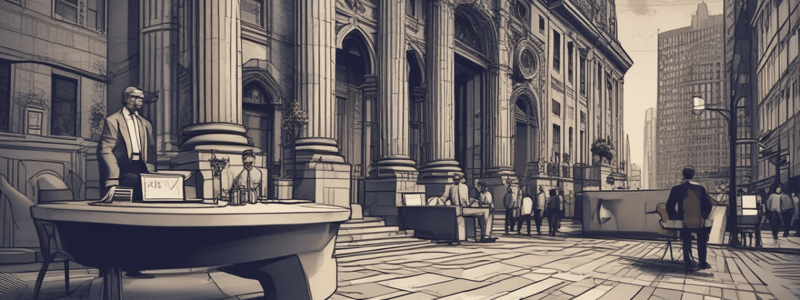Podcast
Questions and Answers
What is the primary principle of occupier's liability according to the text?
What is the primary principle of occupier's liability according to the text?
- Liability for injuries on the premises (correct)
- Liability only in respect of trespassers
- Liability only in respect of lawful visitors
- Liability for criminal acts on the premises
Before the Occupiers Liability Act 1957, what was the status of the rules of common law?
Before the Occupiers Liability Act 1957, what was the status of the rules of common law?
- Abolished
- Remained intact (correct)
- Reversed
- Modified
In Wheat v Lacon (E) & Co Ltd (1966), what was the main outcome regarding the duty of care?
In Wheat v Lacon (E) & Co Ltd (1966), what was the main outcome regarding the duty of care?
- Defendants were not liable as managers
- Owners remained in control but did not breach duty of care (correct)
- Defendants were not in control
- Owners breached their duty of care
What is emphasized about control in occupiers' liability according to Harris v Birkenhead Corporation (1976)?
What is emphasized about control in occupiers' liability according to Harris v Birkenhead Corporation (1976)?
What type of visitors does the Occupiers Liability Act 1957 primarily focus on concerning liability?
What type of visitors does the Occupiers Liability Act 1957 primarily focus on concerning liability?
How does the extent of an occupier's ordinary duty change according to Harris v Birkenhead Corporation (1976)?
How does the extent of an occupier's ordinary duty change according to Harris v Birkenhead Corporation (1976)?
What is the common duty of care under the Occupiers' Liability Act 1957?
What is the common duty of care under the Occupiers' Liability Act 1957?
In Ward v The Ritz Hotel London (1992), why was the hotel held liable for an injury?
In Ward v The Ritz Hotel London (1992), why was the hotel held liable for an injury?
What distinguishes 'occupancy' duty from 'activity' duty under the Occupiers' Liability Act 1957?
What distinguishes 'occupancy' duty from 'activity' duty under the Occupiers' Liability Act 1957?
What does section 2(3) of the Occupiers' Liability Act 1957 state about children on premises?
What does section 2(3) of the Occupiers' Liability Act 1957 state about children on premises?
In Jolley v Sutton London Borough Council (1998), why was the council held liable?
In Jolley v Sutton London Borough Council (1998), why was the council held liable?
What does section 2(3)(b) of the Occupiers' Liability Act 1957 pertain to?
What does section 2(3)(b) of the Occupiers' Liability Act 1957 pertain to?
'Warning of danger' under section 2(4)(a) of the Occupiers' Liability Act 1957 means that:
'Warning of danger' under section 2(4)(a) of the Occupiers' Liability Act 1957 means that:
'Warning of danger' under section 2(4)(a) of the Occupiers' Liability Act 1957 may not absolve an occupier from liability when:
'Warning of danger' under section 2(4)(a) of the Occupiers' Liability Act 1957 may not absolve an occupier from liability when:
'Occupancy' duty under the Occupiers' Liability Act 1957 primarily revolves around:
'Occupancy' duty under the Occupiers' Liability Act 1957 primarily revolves around:
What must be done in order for an occupier of premises to owe a duty to a person who is not a visitor?
What must be done in order for an occupier of premises to owe a duty to a person who is not a visitor?
In British Railways Board v Herrington, why was the defendant held liable for a child's injury on electrified railway?
In British Railways Board v Herrington, why was the defendant held liable for a child's injury on electrified railway?
In the case of English Heritage v Taylor (2016), why was the defendant held liable for the claimant's injuries at Carisbrooke Castle?
In the case of English Heritage v Taylor (2016), why was the defendant held liable for the claimant's injuries at Carisbrooke Castle?
What factor determines what is considered reasonable in providing protection against dangers for trespassers?
What factor determines what is considered reasonable in providing protection against dangers for trespassers?
What principle is reflected in the Occupiers' Liability Act 1957 regarding the duty of care owed to visitors?
What principle is reflected in the Occupiers' Liability Act 1957 regarding the duty of care owed to visitors?
In Ratcliffe v McConnell, why were the occupiers not held liable for the student's injuries at the swimming pool?
In Ratcliffe v McConnell, why were the occupiers not held liable for the student's injuries at the swimming pool?
Under the OLA 1957, when can an occupier escape liability for dangers caused by independent contractors?
Under the OLA 1957, when can an occupier escape liability for dangers caused by independent contractors?
Why was Congleton Borough Council held not liable in Tomlinson v Congleton BC despite a lake accident?
Why was Congleton Borough Council held not liable in Tomlinson v Congleton BC despite a lake accident?
What legal concept is encompassed in 'volenti non fit injuria' as per the Occupiers' Liability Act 1984?
What legal concept is encompassed in 'volenti non fit injuria' as per the Occupiers' Liability Act 1984?
What distinguishes warning requirements under OLA 1957 from OLA 1984?
What distinguishes warning requirements under OLA 1957 from OLA 1984?
According to Lord Moulton in Addie & Sons Ltd v Dumbreck (1929), what duty does an occupier owe to a trespasser on their premises?
According to Lord Moulton in Addie & Sons Ltd v Dumbreck (1929), what duty does an occupier owe to a trespasser on their premises?
According to Lord Wilberforce, what factor affects what is considered reasonable in preventing dangers on property?
According to Lord Wilberforce, what factor affects what is considered reasonable in preventing dangers on property?
In Ratcliffe v McConnell, what prevented the occupiers from being held responsible for the student's injuries at the swimming pool?
In Ratcliffe v McConnell, what prevented the occupiers from being held responsible for the student's injuries at the swimming pool?
Why did the Court of Appeal (CoA) overturn the trial judge's decision regarding LBS' liability in a specific case?
Why did the Court of Appeal (CoA) overturn the trial judge's decision regarding LBS' liability in a specific case?
Why did the House of Lords reverse the decision and hold Congleton Borough Council not liable in Tomlinson v Congleton BC?
Why did the House of Lords reverse the decision and hold Congleton Borough Council not liable in Tomlinson v Congleton BC?
What factor is crucial in determining an occupier's liability towards visitors under the OLA 1957?
What factor is crucial in determining an occupier's liability towards visitors under the OLA 1957?
'The court is required to consider all circumstances.' This statement is particularly relevant in cases involving what legal concept?
'The court is required to consider all circumstances.' This statement is particularly relevant in cases involving what legal concept?
Why did Congleton Borough Council avoid liability in Tomlinson v Congleton BC?
Why did Congleton Borough Council avoid liability in Tomlinson v Congleton BC?
'Occupiers must take reasonable steps.' Which case exemplifies this requirement under the OLA 1957?
'Occupiers must take reasonable steps.' Which case exemplifies this requirement under the OLA 1957?
What is the key difference between strict liability provisions under OLA 1984 and negligence principles under common law regarding occupiers' duties?
What is the key difference between strict liability provisions under OLA 1984 and negligence principles under common law regarding occupiers' duties?
Why did the court find The Mayor of Hastings liable in Woodward v The Mayor of Hastings (1945) despite arguing that cleaning had been outsourced?
Why did the court find The Mayor of Hastings liable in Woodward v The Mayor of Hastings (1945) despite arguing that cleaning had been outsourced?
Flashcards are hidden until you start studying




